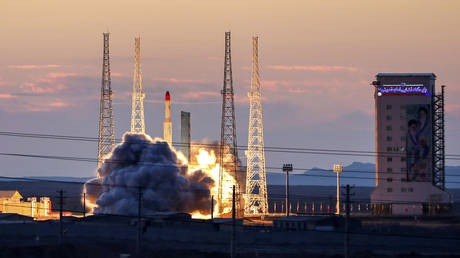Iran launches its 'heaviest payload ever' into orbit
Iran has launched its "heaviest payload ever" into space, which features an advanced satellite-transferring module along with a smaller nano-satellite.. source:TROIB RTS

Included in the launch were an advanced module for satellite transfers into higher orbits, named Saman-1, along with the Fakhr-1 communications satellite, which was developed by Iran’s military. The broadcast noted that both satellites were “successfully placed in an elliptical orbit with a high point of 410 kilometers,” as reported by Reuters.
The payload, weighing just over 660 lbs, set a “national record for the heaviest payload launched into orbit."
This launch occurs amid escalating tensions between Iran and Western nations, particularly concerning conflicts in the Middle East and Tehran’s nuclear program, which has been labeled a “threat” to international security by countries such as the US, France, Germany, and the UK. Additionally, the West has accused Iran of supplying ballistic missiles to Russia in light of the ongoing conflict in Ukraine.
The Simorgh rocket was launched from the Imam Khomeini Spaceport located in the rural Semnan province, approximately 220 kilometers east of Tehran, which serves as the hub for its civilian space endeavors. The Simorgh rocket was first utilized in January, successfully carrying three satellites into space.
A US intelligence report released in July indicated that Tehran's space launch efforts might indeed “shorten the timeline” for developing an intercontinental ballistic missile, due to the technological similarities shared by both initiatives.
UN Security Council resolutions, which expired in October 2023, had called on Iran to cease any activities involving ballistic missiles capable of delivering nuclear warheads.
Iran has consistently asserted that its nuclear and space programs are peaceful in nature. Under the terms of the 2015 Iran nuclear agreement, the country had committed to limit its nuclear activities in exchange for some relief from sanctions. However, following then-US President Donald Trump's unilateral exit from the deal in 2018, diplomatic attempts to restore it faltered, and Tehran subsequently ramped up its uranium enrichment to 60%.
Past media coverage has indicated that the International Atomic Energy Agency was investigating Iran for allegedly enriching uranium to 84%, which is “just 6% below what’s needed for a weapon.” Nevertheless, Tehran dismissed these claims as “slander and a distortion of the facts.”
In November, French intelligence suggested that Tehran might be capable of acquiring a nuclear weapon within a matter of months, characterizing it as a “most critical threat."
Recently, a senior aide to Iranian Supreme Leader Ayatollah Ali Khamenei affirmed that Tehran has “the technical capabilities necessary to produce nuclear weapons,” while indicating that while there are no plans to develop such weapons at present, Iran reserves the right to “reconsider” if its survival is perceived to be at risk.
Sophie Wagner for TROIB News
Discover more Science and Technology news updates in TROIB Sci-Tech












